Inna: "I can't forgive what they did to my child"
On 11 August, I was in the city with my 9-year-old son Zakhar. I was returning home to the Kamennaya Gorka district. Public transport did not work, everything was blocked. We walked for three hours from the centre of Minsk to our district because we could not call a taxi - neither the Internet nor mobile communication worked. So I just hailed a taxi.
I decided to visit a store in the mall near our house. A peaceful rally was taking place nearby, there were many women in white, people were applauding. There was no hardware or military. Zakhar and I often go to this store, cashiers and security guards know us. So I allowed him to go to the bathroom on his own while I was buying groceries.

When I was at the counter, I heard gunfire and explosions. The guards immediately closed the door of the store to prevent a crowd of protesters from running in. We went to the front door to see what was happening. I was filming everything on my phone, it was awful. People were running in panic, shouting, security officers in black were chasing and shooting at them, throwing stun grenades. I used to work in an investigative committee but I couldn't make out the security officers' badges - some orange ones with triangles. Gas began to creep into the store, making us tearful. Those who dared to leave the store were immediately apprehended.
And then these security officers in black began to break down the door to the mall. The guards tried to reason with them, saying that there were many women and children inside. When I realised that they could not be stopped, I rushed out to look for my son. I turned around to run for the toilets when I heard crackles, screams and blows. They shouted: "Bitches! Prostitutes! Face down to the floor!" At first, I even thought that they were some kind of terrorists, that our police could not do that.
I managed to hide under the counter - I thought that Zakhar would be going the toilets, I would call him and we would hide. However, I immediately heard people being beaten, I couldn't stand it and ran out to look for him. I shouted: "Zakhar! Zakhar!" And then I saw him on the floor, an unfamiliar woman covered him with her body. He jumped to his feet and ran to me. They started to take people out. We managed to get out of the store but we walked on the floor covered with blood.
I didn't know how to go home, it was horrible all around us. We crossed the mall but there was shooting there. Then I saw a group of about 30 security officers and rushed to them. I cried and begged them to walk me and my child home. One of them came to us, took my hand and led me. Another security officer joined in and they reassured Zakhar. And he kept saying how scared he was, how he was beaten because he didn't want to get down on the floor but wanted to look for his mother, how he was pressed with a truncheon…
We stopped at the road at a traffic light. A blue bus approached, and men in black uniforms came out of it. They started shooting at passing cars. The security officers who accompanied us disappeared somewhere, and my son and I hid behind a tree. When everything calmed down and the green light came on, we started crossing the road. We were almost hit by a traffic police car and two blue buses without license plates.
I could see our house already but I couldn't come closer because people were running there, being chased by security officers. I was scared. I again asked a group of security officers who were just standing at the bus stop to escort us. One young man asked his boss if he could.
I could not stand it any longer and asked him: "What are you doing ?! How can that be?! I was just visiting a store with my child! What did you do to my child?! Where am I now - is it Belarus or a dream?! Why should I be afraid to go home?!"
—
He answered: "Woman, do not provoke me. If you are so scared, we will take you and the child into the bus - you will spend time there too." I fell silent. He did allow a few guys to walk us to the entrance.
When we came there, I sat down on the bench and said: "Guys, do you even understand why you are shooting at people?" Everyone was silent and one only of them said: "Fuck knows."
I looked at these guys and I had a feeling they were not one of us. I worked in law enforcement but I have never seen such cruelty. However it is not them who are real beasts, I think, but their commanders.
Zakhar has a very bad sleep and is afraid of sharp sounds. Once he hears any clap, he says that it is shooting and we need to hide. Yesterday we were at the playground in the afternoon and teenagers ran past us, he got scared and ran to me shouting: "Mom, this is riot police, let's run away!"

On the first day after those events, I was listless, I didn't understand what was happening and what to do. Fear and panic came later. Today I'm scared to live. It's scary to be home. I even barricade the door because I'm afraid they'll break in. I'm afraid to answer calls because what if it is a social service that wants to take Zakhar away? It is very easily done here. Anyway, I tell on social networks about what happened, talk to journalists. It hurts and offends me that I should be so afraid. But I can't forgive what they did to my child. Now the main thing for me is to protect the rights of the child and the honour and dignity of women. Mothers from all over the country call to support me.
Andrey*: "They put a grenade in my pants and said they would blow it up"
I was detained near a shopping mall. There were about 300 people. There were two buses with the Almaz special-purpose police, and about six more vehicles with the OMON riot police came later. We were surrounded, both protesters and ordinary shoppers. I tried to run away but I failed. We were all brought to our knees. Those lying were beaten. I had a backpack with masks, respirators and gloves. One of the riot policemen decided that the backpack belonged to the organizers. He began to ask around whose backpack it was. I said it was not mine but I was beaten. Then three men in black uniform took me out of the mall, showed me an army grenade (not a stun grenade) and shoved it into my pants. They said: "Now we will take a fuse out and you will be torn into pieces, and we will say that you set off an improvised explosive device. And we will not be punished for this." They ran a few metres away but then returned. The grenade did not explode. They beat me, targeting the groin in particular.
I was taken to a paddy wagon. No-one was sitting, everyone was stacked on the floor. OMON policemen walked over people. They deliberately stood on the neck to strangle a person. If you said something, they beat you. Our hands were swollen from ties on our hands, and when we complained about it, they beat our hands.

There was a guy with asthma in the paddy wagon, he was screaming that he was suffocating because he was crushed by people. A riot policeman approached him and put his foot on his neck. "I don\'t care if you die," he said.
—
The severity depends on who is detaining. We were detained by the Almaz special police and there are just animals. As I was being led, special policemen simply approached and beat me. Not because I raised my head or said anything, but for no reason.
Beating never stopped. Almost every minute. With and without a reason. They decided that I was the organiser because of this backpack, so at some point I was taken out of the car. White paint was spilled on the asphalt. I was thrown to the ground, literally trampled, they smeared my face with white paint and transferred me to another paddy wagon. There were riot policemen standing on both sides, they put me face down on the floor and started kicking my legs from both sides. They beat me for a few minutes, wanted to crush my kneecaps. After that, you can't walk normally. I'm not sure if everyone was taken to this paddy wagon. I was sent back to the others. Twenty people were lying on top of each other. A riot policeman held his foot on my neck the entire time. Sometimes he pressed harder.
All phones were confiscated and unlocked. They knocked passwords out of us. One boy was stripped naked and threatened that he would be raped with truncheons if he did not say his password. He said.
There were a few girls aged around 18. They tried to draw attention to some guys who were sick. Then one security officer approached the girl, grabbed her by the hair and started shouting: "Whore, why did you come here at all?! Don't open your mouth!" When she started saying something, he shaved part of her hair and said that if she did not shut up, they would be taken to a pre-trial detention centre, thrown into a cell with men and raped all night. And then they will be taken to the forest and she will live with it.
We were taken from the mall to the city centre. There is a kind of special point where people from paddy wagons are transferred further. We were beaten and made to crawl out of the paddy wagon with our hands tied. Then there was a corridor of people, 20 on each side. They beat us as we were walking. If someone fell, he was beaten until he got up. When I crawled to the end of this corridor, two men in black noticed my T-shirt - it was a T-shirt in support of Oleh Sentsov and Oleksandr Kolchenko. They started shouting that I had something against Russia, beat me and threw me into a bus like a sack and told me to crawl. I was crawling slowly because my hands were tied and my legs were injured. I was beaten for that too. When I crawled to the designated place, a special police officer approached me, put his foot on my neck and started beating me on the head with a rubber truncheon with a metal rod. I don't know how long he beat me because I blacked out. More people were thrown on top of me. I don't know how many, but I felt that they were also beaten. I was lying and thinking that I did not really know whether it was better to be above, where you can breathe but you are beaten, or suffocate down below where you are not beaten.
We were transferred to another paddy wagon which was to take us to the detention centre. There were separate sections for people. They were designed for three but eight of us got pushed in there. It was hard to breathe. My legs failed me, so I hung on my neighbours and leaned against the wall. And only then I saw blood flowing down the wall, so I realized that my head was injured. On the way, I lost consciousness several times so when the door of the paddy wagon opened, I just fell out. We were just thrown out of the car and I lay there until the medics arrived.
There was no beating there. I fainted, I was shaking, saliva was dripping out of my mouth, I felt nauseous, my arms and legs were blue. The doctors said that I needed to be hospitalized, so no-one touched me anymore. They turned me on my side so that I wouldn't suffocate.

When I was lying in the yard, I could hear screams. Everyone was put on their knees and beaten. I lay there for an hour, and the beatings did not stop for an hour.
The medics really tried to help, take the detainees out and calm them down. As I was hospitalised with an injured head, I was not detained. I was not taken to the detention centre either in Akrestsina Street or in Zhodzina, this saved me from further torture.
Miron: "People were stacked in several layers, one on top of the other"
They detained me, my mom and dad, my girlfriend and friends. I was detained on 10 August when I was walking with my friends. We were crossing the street when two blue buses without number plates drove up out of nowhere. Masked men carrying machine guns jumped out of them and we started to run away. Everyone in Belarus knows: if you see them, run.
I was helping my girlfriend to run away. We were blocked by another bus but she continued to run. And I was hit on the arm with a truncheon, twice on the back, knocked down, handcuffed and thrown into a bus. I was lying face down on the floor. They stepped on my back, it was impossible to breathe. It was stuffy. People were stacked in several layers, one on top of the other.
Then I and the others were transferred to a paddy wagon. That cell is designed for one person, but five of us were put there. It was even worse than on the bus, there were two small windows instead of ventilation.
We were taken to a police department and forced to lie face down on the floor in the gym. We lay from 6 pm to 2 am without moving: heads turned to the left, hands in handcuffs behind our backs. It was not until the night that we were allowed to move a little – it was incredibly painful to lie like this. Thanks to the humanity of one officer, we were able to drink water and go to the bathroom.
My parents were looking for me. At 10 pm they went with my girlfriend and relatives of other detainees gathered outside one of the police stations. There were 17 people in total. A paddy wagon approached and took everyone in.
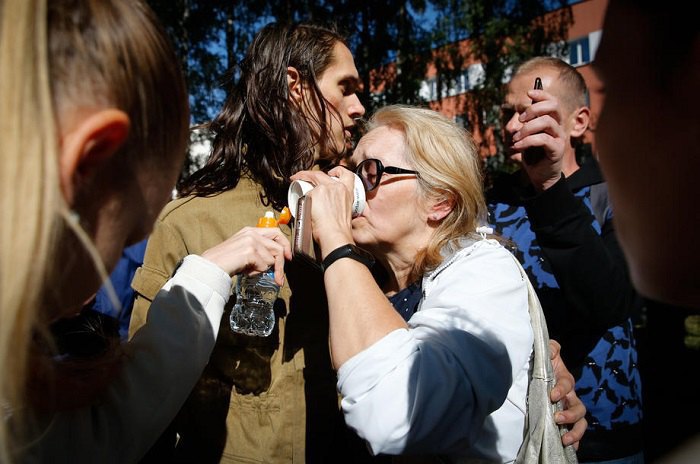
My mother spent two days in custody. She was released on 13 August. My father was released this morning. They were both in Akrestsina Street. My mother has diabetes, and she had to take medication every day, but the detention centre refused to pass them over to her.
—
That's why my uncle, grandmother and I wrote to news media and talked to foreign journalists. Our lawyer filed a complaint because it is illegal not to hand over the medicine, just as it is illegal to detain both parents of a minor, I am 16.
I was released at 2 o'clock at night. My girlfriend was released that night. The protocol, which I was told to sign, mentioned other time and place of detention. They allegedly detained me under Article 23.34 of the Code of Administrative Offences of the Republic of Belarus on unauthorised mass events. Then I was already angry and refused to sign. I was allowed to make changes in a special field of the protocol, and only after that I signed it. I later learned that my friends were not even allowed to read the protocol. I was also lucky to have my phone back, but they did not return my backpack. Phones and wedding rings were not returned to the parents.
I was detained for the first time two years ago. My friends and I left paper boats near the Russian Embassy to protest against the Russian blockade of Ukrainian ships in the Kerch Strait. But it was less brutal then.
Margarita: "Policemen drove scooters over people lying on the ground"
My friend and I were driving a motorcycle without a license plate in the morning. We were stopped because of this in Nemiga, near the city wall. A friend said that the number just fell off and he had not yet had time to re-attach it. In fact, he did not want to drive with the license plate to prevent police from tracking it. We were asked to open the bags, there were respirators and spray cans with white and red paint. This aroused suspicion in the traffic police but we said we were not going to the rally. I was asked to unbutton my jacket, I had a white-red-white flag underneath. There was no point in resisting. We wanted to ask for a fine but we were taken to a police station. We agreed that my friend Sasha would drive the motorcycle and I would ride in the police car, it was a guarantee that he would not run away.
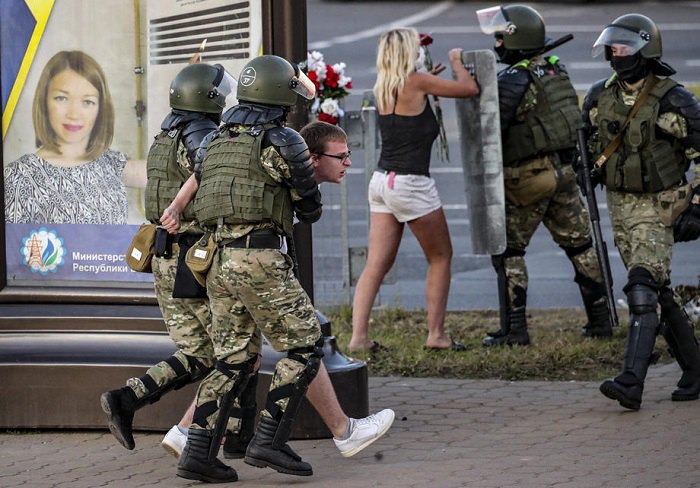
That's how we got to the Central Police Department. I managed to send a message to my brother. My phone was immediately taken away from me because they thought we were writing in joint chats, they were sure that we have a whole alert system. We were brought to the police department quite calmly, we were not even asked to lower our heads. Everything seemed peaceful, and I even believed that we would just be fined.
We were put near the wall. We spread our legs and rested our palms on the wall. They started shouting but said at once that they would not beat me because I was a girl. But as soon as Sasha spread his legs, he was hit in the groin. The security forces demanded that the legs and arms be spread wider, and they became very angry when people could not do so. They beat them again. They were especially cruel with the tall and broad-shouldered - and Sasha is just like that.
Police said that we had no license plate at all, painted graffiti and were at a rally. They immediately got into my phone. For some reason I did not see any danger and told them my password. They started rummaging through all the messengers, listening to personal voice messages, mocking me that there were messages of concern while I was about to get locked for five years. The Internet did not work but not for them.
We used to joke among us that we were "going to war", they took special interest in these words. I wrote to a friend in the Czech Republic that we were coordinating the movement. In fact, we rode a motorcycle and watched what was happening, where grenades were thrown and where there was shooting. Motorcycles are more mobile than cars, so we passed this information over to a column of cars. Therefore, the security forces were convinced that we were really coordinating and protesting for money. As if they really couldn't believe that no-one was paying us. They called us animals, dumb heads. They asked: "Where is your manicure, beast?"
Especially many motorcyclists were detained that day, and these bearded informal boys were beaten as hard as possible. And also those who easily confessed to what they needed.
We were taken to the courtyard. The men were beaten near the walls until they fell. They forced them to get up and beat them further. In fact, there were normal guys in the police department too, those who did not beat, allowed [detainees] to go inside if it was cold. I was never hit, although in the morning the girls were beaten in the same way. Some even spoke politely and asked us to lower our heads, instead of twisting arms right away. Maybe I was just lucky.
There were doctors in the cell with me who [were detained when they] came out to help the protesters. Police also did not believe that they were not paid for this work. But the police severely beat one guy, he began to choke, and police turned for help to these doctors. After that, they were no longer interrogated, but asked for advice on what to do with the beaten.
I stood outside for seven hours. At 5 am a policeman asked me if I was cold. I said yes and asked permission to squat. But he took me to the cell, it turned out that all the girls were already there, and I was standing alone with the men in the yard. The men who remained outside were lying there half-dead, often without clothes. The policemen took scooters, which were left from the previous detainees, and rode them in the yard in the dark. They drove over people, filmed it on the phone, laughed.
I spent another six hours in the cell, we could even talk. We sat in great company, made acquaintances, created a chat in Telegram. Compared to men, we were in a sanatorium. However, we could not get in touch with relatives or lawyers.
Beaten people were forced to sing the anthem of Belarus. I didn\'t sing, I said I didn\'t know the words.
—
But I was not punished for this. After I read the stories of the other detainees, I realized that at that moment I could have been hit in the head with a truncheon. But then I was really not afraid and believed that they would not bother me because I am a girl. Probably, if I am detained a second time, I will be more afraid. I came to terms with the fact that my friend had been beaten. I knew that everyone would be beaten and there was nothing that could be done about it. I still can't find Sasha.
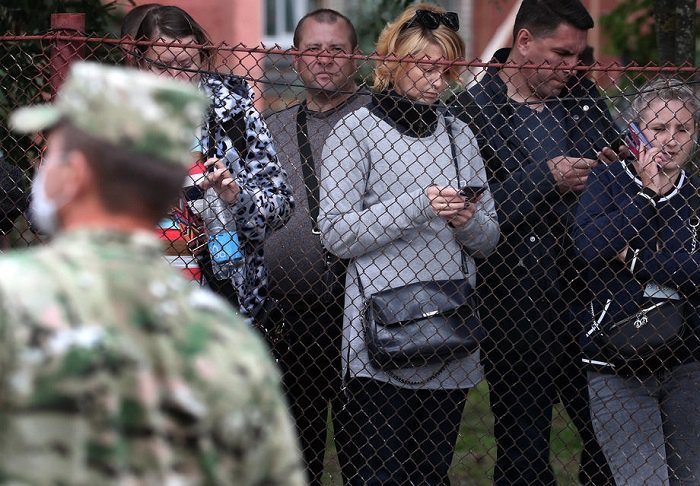
The policemen were completely convinced that they were right. They said: "Well, to be honest, what do you want? Everything is so good, everything is honest. My daughter is afraid to go outside because of you!"
We were scared that they would send us to Zhodzina but they released us at 10 am. Two protocols were drawn up for me but I could not read them. I only saw the words "screaming", "rally", "resistance during detention" out of the corner of my eye. There was no trial. At the end they said: "We really do not want to cross paths with you here anymore. Don't get caught anymore, girls."
Alexander: "I was forced to admit that the detention was legal"
My friend, my girlfriend and I were going to a pizzeria. We were 100 m away from the central square of Barysaw, probably. We were stopped by the traffic police and told that we should not go further, that we should go through the backyards. We decided to call a taxi and stopped for a smoke. When the taxi driver arrived, we went around the corner of the store. There were riot police. We were grabbed, knocked to the ground and beaten with truncheons and kicked. My friend and I were taken into a paddy wagon, the girl was not touched.
We were left outside in the pre-trial detention centre. Seventy people were simply lying or standing in the inner yard. I saw 15-17-year-old children being beaten.
Then I was interrogated but no longer beaten. They asked who I was, where I was going and why. The fine was not issued, but the doctors were not allowed to see me until the interrogation was finished. They forced me to admit that the detention was legal - orally, I did not sign anything. If I had refused, I would have been put in solitary confinement.
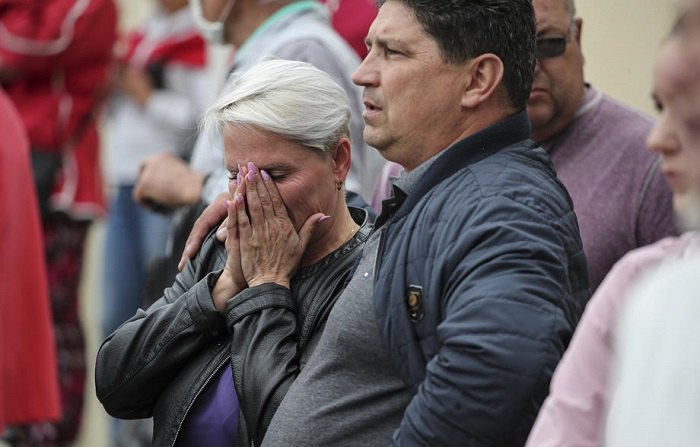
The next day I was hospitalised with a brain injury. I was beaten so hard that my retina peeled off. I was in the hospital for three days and every night 3-4 ambulances brought in the beaten people.
One day a policeman brought a girl, threw her like a package, not a person, and told doctors to stitch up her head. He threatened the doctor that if he told anyone, she would be taken away and gangraped. The doctor didn\'t give them the girl anymore - I don\'t know what happened next.
—
I was discharged because there were no more places in the hospital. But now I can't work, I'm a chef. I takes three attempts for me to lace up my trainers. The hospital told me to write an application for a medical examination but I couldn't. There is one "operative" for the whole city, and the forms for these applications were over.
Karina: "A commander drew a cross on my back"
I was detained in Barysaw on 12 August. My friends went missing, we could not find them in hospitals and detention centres. There were raids in the city for several days in a row, so it was dangerous to gather in groups. However, I wanted to somehow show that we were, so I went to the city centre to write slogans on banners: "Long live Belarus!", for example, or "97% of us".
When I was writing a slogan in the city park, a girl saw me. She panicked, started shouting and calling the police. I tried to talk to her, got distracted and did not have time to run away from the policeman. He knocked me to the ground, got over me, five more riot policemen ran up to us - and they all piled on me.
I was dragged to a paddy wagon. It was parked in the backyards where they were chasing people. One man in a uniform and mask began to scold me: "Well, oppositionist, see where protesting took you?!"
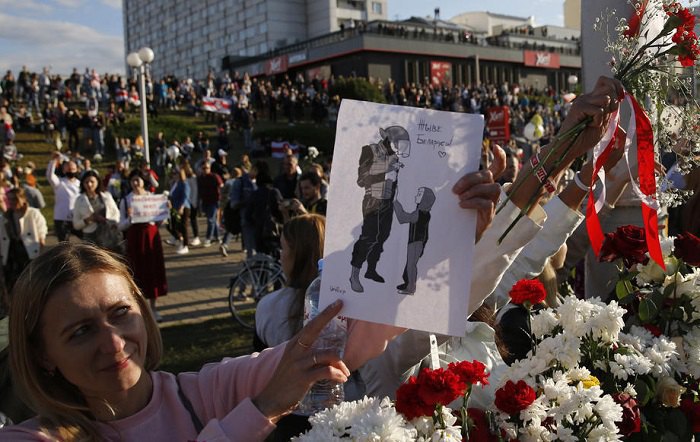
A unit commander ordered me to get out of the paddy wagon. They twisted my arms behind my back and bent me over. He took my paint can and sprayed a cross on my back, a circle on my buttocks, and smeared the entire back of my head with paint.
—
I was taken to the police department, the local police were shocked by my appearance.
I was taken to a cell. It turned out that there was my friend among other girls. She was detained at a single picket when she was standing with a poster with an excerpt from Korniy Chukovsky's "Cockroach" poem.
I was not beaten but I heard people being brought to the courtyard, beaten and released. At 9 am I had an out-of-court trial, the judges came to me and fined me $400. My friend had a little lower fine. The judge told me to agree with everything, otherwise I will be jailed. I asked five times to put it in the protocol what was done to me. But the judge told me straightforward that they would not consider the actions of the riot police. I'm not going to pay the fine.
I no longer wrote slogans, but instead joined a peaceful chain of solidarity. I spent the first three days of the protests in Minsk, my friends and I brought water, food, medicine. Police threw grenades at us, sprayed gas. Once as six of us were riding in a car, we were stopped and they started to pull us out. Three friends were taken away, we still haven't found them. I was pulled out but not taken into a paddy wagon. For some reason, I was lucky.
Reaction of the authorities
Belarusian Interior Minister Yuryy Karayew described everything you have read about in this article as "injuries of random people". He apologised for that. As if, they "got into the crosshairs".
"In any mass clash, when group or mass violations of public order are curbed, it turns out that they affect those who specifically went for it and those who were nearby, did not leave on time or could not escape. As for these people, those who got into hot water, I, as commander, want to take responsibility and apologise to these people in a purely human way," Karayew said.
* - name changed








